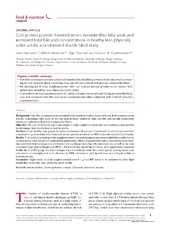| dc.contributor.author | Vildmyren, Iselin | en_US |
| dc.contributor.author | Halstensen, Alfred | en_US |
| dc.contributor.author | Oterhals, Åge | en_US |
| dc.contributor.author | Gudbrandsen, Oddrun Anita | en_US |
| dc.date.accessioned | 2020-08-14T14:47:24Z | |
| dc.date.available | 2020-08-14T14:47:24Z | |
| dc.date.issued | 2019-03-11 | |
| dc.Published | Vildmyren IT, Halstensen A, Oterhals Å, Gudbrandsen OA. Cod protein powder lowered serum nonesterified fatty acids and increased total bile acid concentrations in healthy, lean, physically active adults: A randomized double-blind study. Food & Nutrition Research. 2019;63 | eng |
| dc.identifier.issn | 1654-6628 | |
| dc.identifier.issn | 1654-661X | |
| dc.identifier.uri | https://hdl.handle.net/1956/23797 | |
| dc.description.abstract | Background: Fish fillet consumption is associated with beneficial health effects; however, little is known about whether consuming other parts of the fish such as head, backbone, skin, cut-offs, and entrails (collectively known as residuals) will provide comparable effects. Objective: The aim of the study was to investigate if daily supplementation with cod residual protein powder would impact lipid metabolism in healthy adults. Methods: Forty healthy, lean, physically active participants (18 women, 22 men) with normal body mass index consumed 8.1 g of proteins daily from cod residual protein powder (Cod-RP) or placebo (control) for 8 weeks. Results: Cod residual protein powder supplementation lowered fasting serum nonesterified fatty acids and increased serum total bile acid concentrations significantly when compared with control supplementation. Fasting serum low-density lipoprotein cholesterol and apolipoprotein (Apo) B concentrations, as well as the total cholesterol:high-density lipoprotein (HDL) cholesterol and ApoB:ApoA1 ratios, were significantly decreased within the Cod-RP group, but these changes were not different from the control group. Fasting serum concentrations of triacylglycerol, total cholesterol, HDL cholesterol, and ApoA1 were not changed within or between groups. Conclusion: Eight weeks of daily supplementation with 8.1 g Cod-RP seems to be sufficient to affect lipid metabolism in healthy, lean, physically active adults. | en_US |
| dc.language.iso | eng | eng |
| dc.publisher | Swedish Nutrition Foundation | eng |
| dc.rights | Attribution CC BY | eng |
| dc.rights.uri | http://creativecommons.org/licenses/by/4.0/ | eng |
| dc.subject | lipid metabolism | eng |
| dc.subject | protein supplement | eng |
| dc.subject | residuals | eng |
| dc.subject | fish protein | eng |
| dc.title | Cod protein powder lowered serum nonesterified fatty acids and increased total bile acid concentrations in healthy, lean, physically active adults: A randomized double-blind study | en_US |
| dc.type | Peer reviewed | |
| dc.type | Journal article | |
| dc.date.updated | 2019-11-21T12:45:31Z | |
| dc.description.version | publishedVersion | en_US |
| dc.rights.holder | Copyright 2019 Iselin Vildmyren et al. | |
| dc.identifier.doi | https://doi.org/10.29219/fnr.v63.3437 | |
| dc.identifier.cristin | 1741122 | |
| dc.source.journal | Food & Nutrition Research | |

